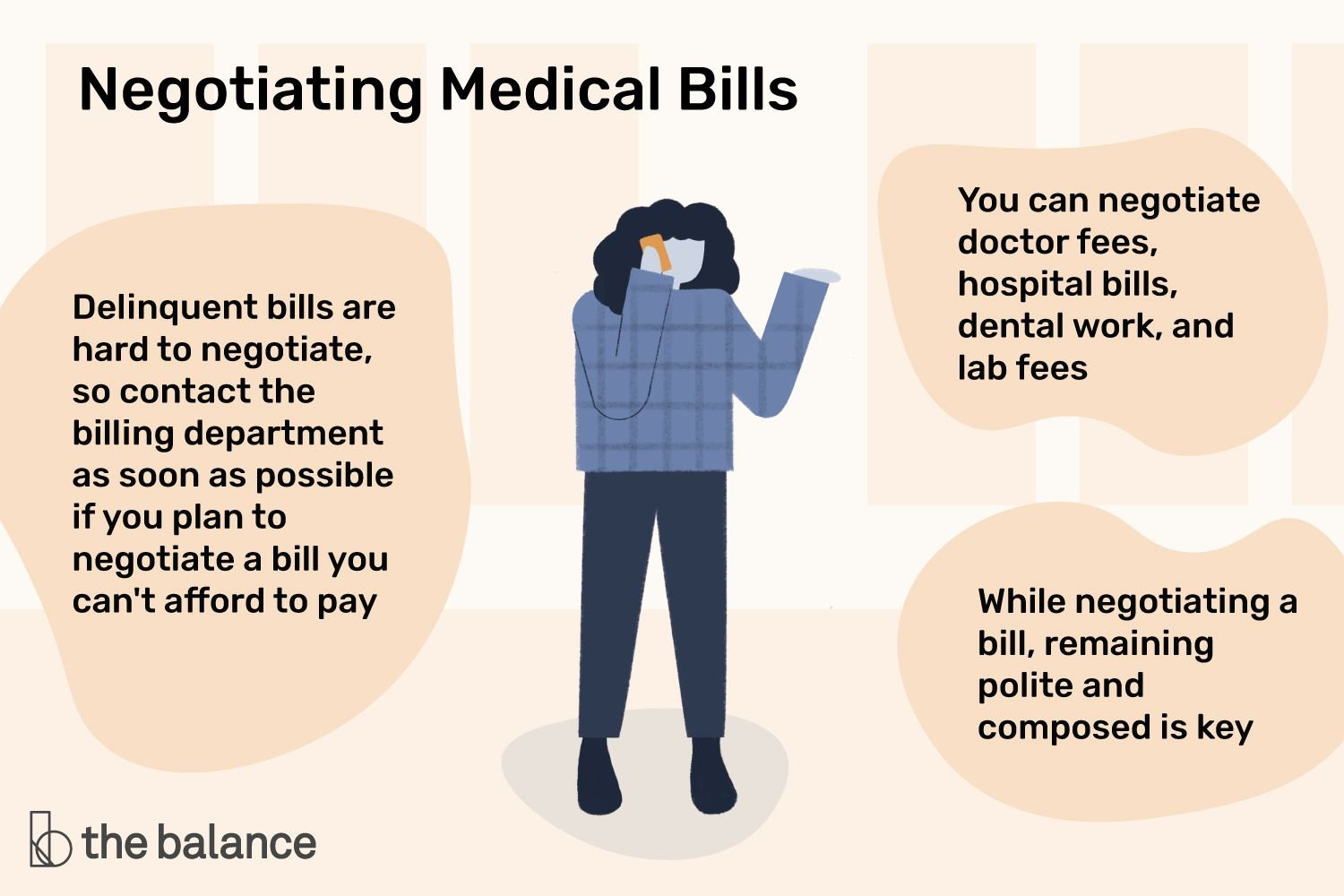Dealing with medical bills after treatment can be overwhelming, but there is hope. You can negotiate your medical bills and potentially save yourself a significant amount of money. Wondering how to negotiate medical bills after treatment? Well, it’s not as complicated as it may seem. By following a few simple steps and having the right mindset, you can navigate the process with confidence and potentially reduce your financial burden. Let’s dive into this important topic and discover effective strategies for negotiating medical bills after treatment.
How to Negotiate Medical Bills After Treatment
Medical expenses can quickly add up, leaving many patients burdened with substantial bills after receiving treatment. However, there are ways to negotiate and potentially reduce these costs. In this comprehensive guide, we will explore various strategies and practical steps you can take to effectively negotiate medical bills after treatment. By following these tips, you can potentially save money and alleviate the financial stress associated with medical expenses.
1. Review Your Medical Bills Thoroughly
The first step in negotiating medical bills is to carefully review each item on your bill. Mistakes and inaccuracies are not uncommon, and they can significantly impact the overall cost. Take the time to examine every detail and ensure that you are being charged correctly. Pay close attention to the following:
- Services and procedures: Verify that the listed services and procedures were actually provided to you. Cross-reference these details with your medical records.
- Medication charges: Determine if the medication costs are accurate and if all the prescribed medications are accounted for.
- Lab tests: Check if the lab tests mentioned on the bill were conducted and if the charges align with the agreed-upon rates.
- Room charges: If you stayed at a hospital or medical facility, confirm that the room charges are appropriate and do not include any unnecessary expenses.
- Insurance coverage: Ensure that your insurance information is correctly reflected on the bill, including deductibles, co-pays, and any other coverage details.
By carefully reviewing your medical bills, you can identify any discrepancies or excessive charges that can be used as leverage during negotiations.
2. Understand Your Insurance Coverage
Before initiating negotiations, it’s crucial to have a clear understanding of your insurance coverage. Familiarize yourself with your policy’s terms and conditions, including deductibles, co-pays, and out-of-pocket maximums. Understanding your insurance coverage will help you assess your financial responsibility and negotiate effectively.
Take note of the following information:
- Network providers: Determine if the medical professionals and facilities you visited during your treatment were in-network or out-of-network. In-network providers typically have negotiated rates with the insurance company, which can affect your out-of-pocket expenses.
- Covered services: Be aware of the specific services and treatments covered by your insurance policy. Some procedures or treatments may require pre-authorization or have certain limitations.
- Appeal process: Understand the process for appealing insurance denials or non-covered services. This knowledge can be valuable during negotiations if certain treatments or services were initially denied but could be justified through an appeal.
Having a solid understanding of your insurance coverage will empower you when negotiating medical bills, allowing you to effectively communicate with both the healthcare provider and your insurance company.
3. Communicate Openly with Your Healthcare Provider
Open and honest communication with your healthcare provider is essential when it comes to negotiating medical bills. Here are some steps you can take:
- Contact the billing department: Reach out to the billing department of the healthcare provider or hospital and discuss your concerns regarding the bill. Explain that you are experiencing financial difficulties and would like to explore options to reduce the cost.
- Seek itemized bills: Request an itemized statement that breaks down the charges into specific categories. This detailed breakdown will help you identify any potential errors.
- Ask for discounts: Inquire about available discounts or financial assistance programs. Hospitals and healthcare providers often have programs in place to help patients who are experiencing financial difficulties. These programs may provide discounts based on income or offer payment plans.
- Discuss payment options: If you are unable to pay the entire bill upfront, ask about setting up a payment plan. Many healthcare providers are willing to work with patients to establish manageable payment arrangements.
- Explain your situation: Be transparent about your financial circumstances. If you are facing hardships or unexpected financial challenges, share this information with the billing department. They may be more willing to negotiate and find a solution that accommodates your needs.
Remember, healthcare providers want to ensure that their patients receive the care they need. By openly communicating your concerns, you increase the likelihood of finding a mutually beneficial resolution.
4. Negotiate with Your Insurance Company
In addition to communicating with your healthcare provider, it’s important to engage in negotiations with your insurance company. Here’s how you can navigate this process:
- Understand your policy: Review your insurance policy and familiarize yourself with your coverage and benefits. Knowing the limitations and exclusions will help you present a stronger case during negotiations.
- Research average costs: Research and gather information on the typical costs of the treatments and procedures you received. This knowledge will enable you to negotiate from an informed position.
- Document conversations: Keep a record of all communication with your insurance company, including dates, names of representatives spoken to, and details of the conversations. This documentation may be necessary if there are any discrepancies or disputes in the future.
- Request pre-authorization: If a treatment or service was initially denied by your insurance company, consider submitting an appeal for pre-authorization. Present additional evidence or medical justifications to support the necessity of the treatment. This step can increase the likelihood of coverage and potentially reduce your out-of-pocket expenses.
- Seek advocacy assistance: If you encounter challenges during negotiations with your insurance company, consider seeking assistance from a healthcare advocate or a patient advocacy organization. These professionals are experienced in dealing with insurance companies and can provide guidance and support throughout the negotiation process.
5. Consider Hiring a Medical Bill Advocate
If you find the negotiation process overwhelming or believe you need professional expertise, you may consider hiring a medical bill advocate. These professionals specialize in negotiating medical bills and helping patients navigate complex healthcare billing systems. A medical bill advocate can:
- Review your bills thoroughly: An advocate will meticulously review your medical bills, identifying any errors or excessive charges.
- Negotiate with healthcare providers and insurance companies: They will communicate on your behalf, using their expertise to negotiate lower rates or discounts.
- Assist with insurance appeals: If your insurance company denies coverage for certain treatments, a medical bill advocate can help you navigate the appeal process and gather the necessary supporting documents.
- Offer financial guidance: Advocates can provide advice on managing medical debt, exploring payment options, and connecting you with resources that offer financial assistance.
While hiring a medical bill advocate may incur additional costs, their expertise and knowledge can potentially save you a significant amount of money in the long run.
6. Seek Financial Assistance Programs
If you are facing significant financial hardships and are struggling to negotiate your medical bills, explore financial assistance programs available through government agencies, nonprofits, and charitable organizations. These programs can provide financial relief or help alleviate some of the burden associated with medical expenses. Some options to consider include:
- Medicaid: If you meet specific income and eligibility criteria, you may qualify for Medicaid, a government-funded program that provides healthcare coverage for low-income individuals and families.
- Financial aid programs: Many hospitals and healthcare facilities offer financial aid programs based on income, providing discounts or fully covering the medical expenses for those who qualify. Reach out to the billing department to inquire about these options.
- Nonprofit organizations: Various nonprofits and charitable organizations assist patients with medical bills. They may offer grants, loans, or scholarships specifically designed for individuals struggling with medical debt.
Research and explore the available financial assistance options in your area. Additionally, consult with a social worker or financial counselor who can guide you through the application process and provide further assistance.
Negotiating medical bills after treatment can be a challenging process, but it is not impossible. By taking proactive steps such as reviewing your bills, understanding your insurance coverage, communicating openly with healthcare providers and insurance companies, considering professional assistance, and exploring financial aid programs, you can increase your chances of successfully negotiating and reducing your medical expenses. Remember, persistence and open communication are key when advocating for yourself and seeking affordable healthcare options.
How to negotiate medical bills #shorts
Frequently Asked Questions
Frequently Asked Questions (FAQs)
How can I negotiate my medical bills after treatment?
After receiving medical treatment, negotiating your medical bills can help you manage your expenses. Here are some steps to follow:
What documents do I need to negotiate my medical bills?
Gather the relevant documents such as medical bills, insurance statements, and any correspondence related to your treatment. These documents will help you understand the charges and serve as evidence during negotiations.
Is it possible to negotiate medical bills with my healthcare provider?
Yes, it is possible to negotiate medical bills with your healthcare provider. Start by contacting their billing department and explaining your situation. They may be willing to work out a payment plan or reduce the charges based on your financial circumstances.
Should I negotiate directly with my insurance company?
While negotiating with your healthcare provider is a good first step, you should also reach out to your insurance company. They may be able to review your bills and negotiate on your behalf, ensuring that you receive the maximum coverage allowed under your policy.
How can I prepare for negotiating my medical bills?
Before negotiating your medical bills, it’s essential to research and understand the average costs for the treatments and services you received. This knowledge will help you make a strong case during negotiations and potentially lower your bills.
Can I hire a medical bill advocate to help me negotiate?
Yes, you can hire a medical bill advocate who specializes in negotiating medical bills. These professionals have experience in dealing with healthcare providers and insurance companies, and they can help you navigate the process more effectively.
What should I do if my insurance claim is denied?
If your insurance claim is denied, don’t panic. Review the denial letter carefully to understand the reasons for the denial. You have the right to appeal the decision, and you can work with your healthcare provider and insurance company to provide additional information or clarification to support your case.
What if I’m unable to negotiate a lower medical bill?
If you’re unable to negotiate a lower medical bill directly with your healthcare provider or insurance company, you still have options. You can explore financial assistance programs offered by hospitals or healthcare organizations, or you can set up a payment plan to manage the bills over time.
Final Thoughts
Negotiating medical bills after treatment can be a challenging yet necessary task. Start by reviewing the bill meticulously, checking for any errors or discrepancies. Then, gather all relevant documents and information to support your negotiation efforts. When contacting the healthcare provider or insurance company, remain calm and assertive, explaining your situation clearly and providing any necessary evidence. Consider exploring payment plans or financial assistance options as well. Remember, persistence and effective communication are key in successfully negotiating medical bills after treatment. With these steps in mind, you can take control of your healthcare expenses and reduce the financial burden.



